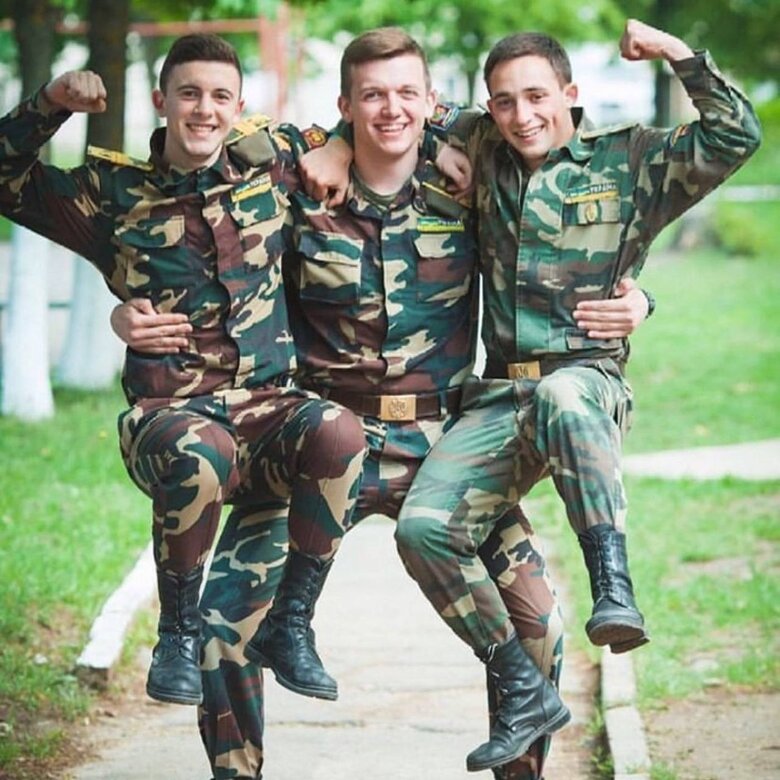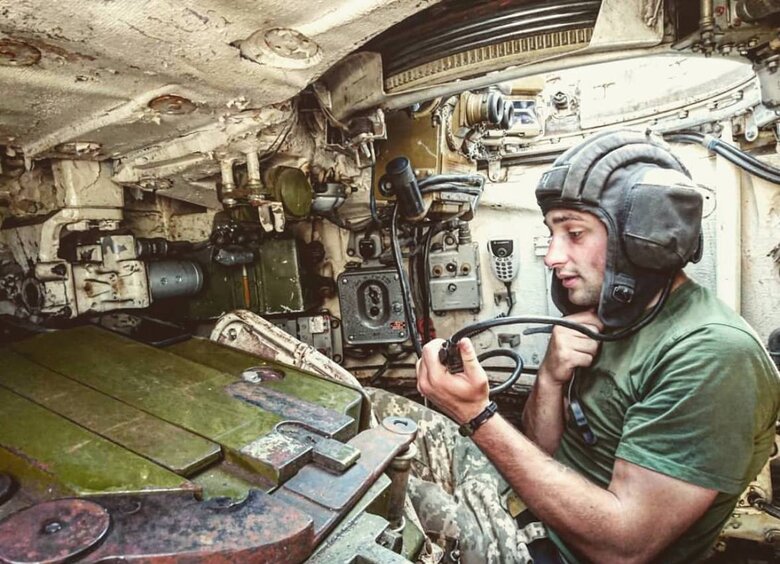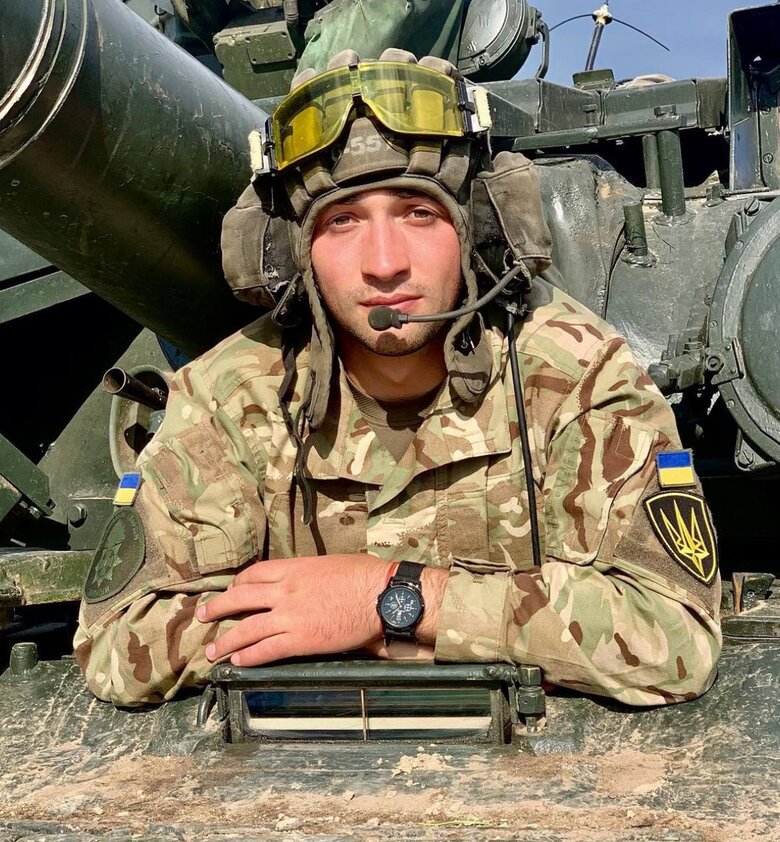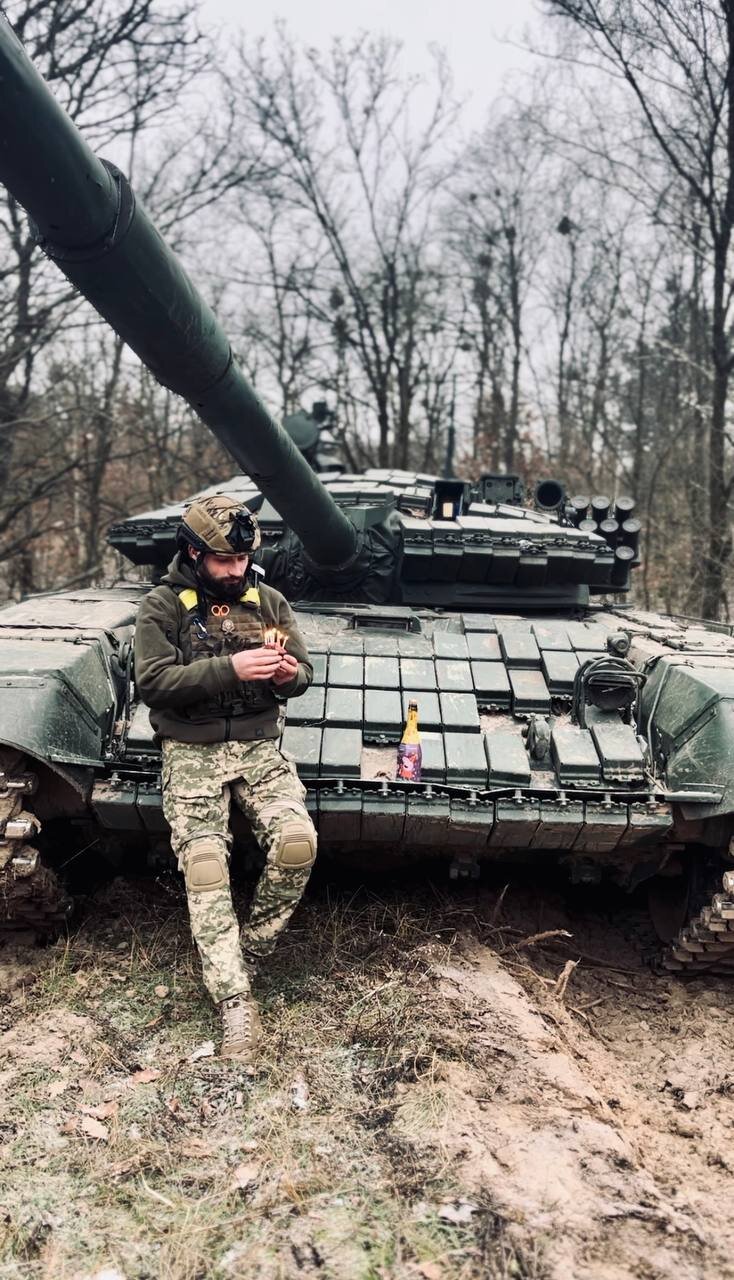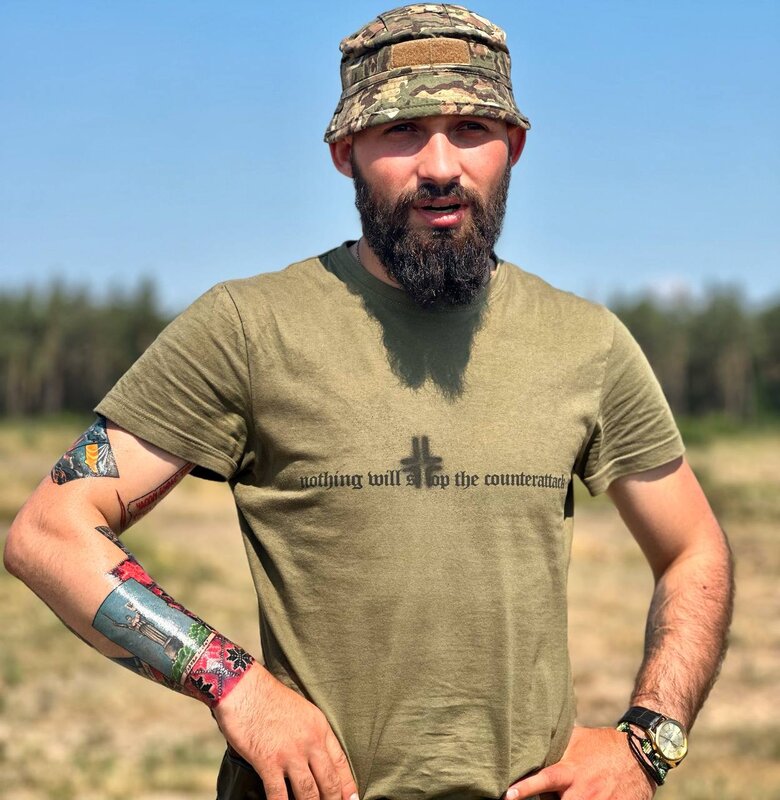Tanker, call sign Lincoln: "Katsaps are storming on buggies and motorbikes"
The commander of the "Rubizh" Brigade’s tank company, Dmytro, call sign Lincoln, like most guys, used to play Word of Tanks on his childhood console. A game we used to call simply "tanks". However, back then he could not even imagine that he would become a tanker. He never dreamed of it, but fate decided otherwise when he entered the National Academy of the Land Forces.
- Before that, you studied at a military lyceum. Why did you choose this educational institution?
- I was motivated to join by the well-known TV series "Cadets", which I started watching in 2011. I watched all the seasons. I liked their lives. So a year later, when I was in the eighth grade, I decided to enter a military lyceum.
- You watched a Russian series!
- (smiles. - O.M.) At that time, no one understood that what we later saw could happen.
- I know that you were seriously into football back then. Why didn't you make a career here?
- Really, seriously. Both before and during my studies at the lyceum, I was actively involved in football. I had access to clubs, including "Karpaty-Lviv". Accordingly, I was selected. But because our country loves money, I had to pay to get into the club. Each of them quoted outrageous prices. At that time, I didn't have that kind of money. So I had to connect my life with the military.
- Where did you end up after your studies?
- After graduation, I was assigned to the "Rubizh-3018" brigade as a tank platoon commander. I continued my service. Over time, I grew to become a tank company commander.
- Why did you become a tanker?
- I have a very interesting story here. After the military lyceum, I passed a commission to enter a higher education institution - the Academy of the Land Forces. Everything went well. I went to the military enlistment office. There was a captain who was dealing with my case. He asked me what faculty I was planning to apply for. I answered: "Anywhere but tanks!" We chose infantry. Later, I came for the entrance exams. I passed. After that, I had to have a final interview with the general based on the results. I was in the first queue. There were about 60 of us in it. At some point, I went to the shop. When I returned, it turned out that I had missed my turn. I came in around the fourth, when all the places in the infantry were taken. So I joined the tank crew. That was my destiny. Now I have no regrets at all!
- What was your first tank?
- T-64BV. Today, my entire company is equipped with these vehicles. I took part in my first battle in a T-72. This is a Russian-designed tank, while the T-64 is ours.
- Where was this first battle?
- In the area of Triokhizbenka, Luhansk region, on 25 February 2022.
- Tell us in detail how it went.
- On 23 February, we arrived at the base between Sievierodonetsk and Rubizhne. The next morning, the shelling began. Accordingly, we were put on combat alert and sent to reinforce one of the Armed Forces brigades to help stop the enemy's offensive in the area of Triokhizbenka. I was a tank commander at the time. The commander went with us in another tank. We arrived a little late - Russia had stopped advancing in that area and was amassing troops. We stopped at the KSP to rest until tomorrow. In the morning, everyone started fussing and shouting: "The enemy is here!". Panic. It was raining. Nothing is clear. My commander and I go to meet the enemy. As soon as we entered the village, we immediately saw an enemy column in our sights. With the first shot, the commander's tank immediately hit their front vehicle, and mine had already finished it off. The column stopped and started to turn around to go in another direction. The Russian infantry came to our positions, so we still had enough BC to stop them a little and inflict losses on them. When we ran out of shells, we went to reload. Then we were supposed to move back to the firing line, but we were told it was too late - the Russians had made a breakthrough.
- It was your first fight, was it scary? What emotions did you experience?
- I could not even understand whether it was a fight or not (smiles - O.M.). I went through on adrenaline. When I came out and saw a tank shot by a machine gun and cut up by debris, I felt lighter and smiled.
- Today you are still working on the T-64BV, a Soviet-style tank. Is it about quality?
- Yes, it's a Soviet-made vehicle, but it performs well on our terrain. This tank is passable here. It can be used like artillery - that is, it can operate from a closed firing position, which makes it harder for the enemy to hit it. The same Leopard and Abrams tanks do not have this feature. By the way, we are told how great these NATO tanks are. But they have very poor armour. We can say that they are "cardboard machines", "matchboxes". Our tanks are better at this. Ours are more likely to survive.
- What are the disadvantages of the T-64BV?
- Weak engines - it reaches low speeds. The book says: up to 60 kilometres per hour. In reality, it can't do that. Another disadvantage is that no matter what the weather is like - summer or winter - it always needs to be warmed up. There is a system called a heater. This process requires an additional 20 minutes. Otherwise, you can't start it. So you lose precious time.
- What is the fuel consumption?
- A full refuelling is one tonne two hundred and seventy. This includes the outer and inner tanks. At war, we fill only a part of it - 700 litres. I have never counted how much we spend in combat. It varies. We try to keep the vehicles in full combat readiness - fuelled and charged.
- Did you ever run out of fuel during a battle?
- No, it wasn't. They say: "If you run out of fuel, it's a crew of morons" (smiles - O.M.).
- But it happens that you run out of ammunition, as you told us about the same battle on 25 February...
- Yes, because we have only 28 shells in our conveyor belt. We can say that this is enough to hit a certain area, but in reality, it's not very much. There were times when we simply did not have enough, even though the infantry asked for more. But we are not going to equip BCs on the front line. We have appropriate places for that.
- The tank is a demotivator for the enemy. Can you feel it?
- Of course! It is, both on our side and theirs: as soon as the tanks move out, it becomes more difficult for the infantry. Because you have a 42-tonne machine coming at you, and it's also fighting you. I talked to the infantrymen. They say that nothing shoots as scary as a tank.
- You can't hear the "exits" either.
- Yes, only the "arrival". This is a really scary machine. When the enemy hears such heavy equipment coming, everything goes flying in response: artillery, FPV, and Lancets.
- By the way, how actively do drones hunt you ?
- The Katsaps are inventing different ways to destroy the vehicles. Nowadays, they use Lancets and FPV the most. But we have so-called "anti-lancet" defence. This is an effective thing. There have already been cases when it worked and prevented damage to the vehicle. And against FPV, we have dome radars. They operate on the appropriate frequencies used by the FPVs.
- And how can you protect yourself from other injuries?
- If we talk about artillery damage, it is better to sit in a tank and get out of the area as quickly as possible.
- Was there any damage to your tank?
- Three RPGs hit the vehicle. They can also do a lot of damage to a tank if they hit a specific point. We were either lucky that time, or it was a sign that we had something else to do in this world, so we did not die.
- Did you have any tank "duels " with the enemy?
- In Triokhizbenka, when we met the convoy. Then we managed to hit them first.
- You can't hear what's going on outside the cabin. It must be very scary, loud and powerful.
- When I was a tank commander, I was inside and took part in the battles, so I didn't hear it. Now, as a company commander, I can see from the outside how it all happens. It's really scary.
- What is the most important thing in a tanker's job?
- First and foremost, it is our decisions to preserve the lives of our personnel and our responsibility.
- Is it difficult to bear this responsibility for the staff?
- Of course! As a commander, my head can be very clogged - it boils and hurts when you worry about each soldier. At some points, you are even afraid when making decisions. But I will say this: each of them has the right to live, regardless of whether they were taken by a colonel, lieutenant or soldier.
- What would you say to those who call tanks the last century?
- Most often, this is said by those who have not encountered a tank and have not seen it happen. Or those who believe that the same FPV drones can easily hit the equipment. But, as I said, there are means to defend yourself, and the tank could do its job on the battlefield. It is a very powerful machine that can both hold the defence line and break through it in a certain area of the frontline. When a tank moves to a position to stop a breakthrough or make a leap forward to push them back, our infantry's morale rises dramatically.
- I think FPV is also often mentioned because this war is called the drone war. But we understand that you can't win with drones alone...
- Yes! Just like you can't win without personnel. Everyone knows that there are problems with this now. I won't tell you how things are going in each area, but everyone who is at the front is doing well, they are holding on! However, today we are talking about a war of mobilised people. Previously, there were regular units, contractors who could "show their teeth" to the enemy and fight more aggressively, but now it's not so.
- Contract soldiers are trained people, while the mobilised ones still need to be taught.
- Of course! But with the situation on the frontline like we have, you just might not be able to make it.
- And who is fighting against you today in the Bakhmut direction, where you are? Are they also mobilised from the other side?
- Look, in Rubizhne, we faced regular Wagners - not the convicts who fought in Bakhmut, who were trolled by everyone, but trained and fierce guys. They could take a company out of position without the support of equipment. Just with machine guns! At the time, there was a "Z-storm" in our direction. But about two weeks ago, they were reinforced with paratroopers, because by the first of May (we recorded the interview on the third of May - O.M.) they received an order to take a certain settlement (I won't say which one). They fail to do so. They stormed this section of the frontline and suffered losses.
- What are these assaults?
- They are very interesting. I was amazed. Katsaps storming on buggies and motorbikes. I don't know how motivated you need to be to agree to this. A healthy, conscious person understands that they are 90 per cent "two hundred" in this case. But they rush forward and want to show results. However, once again, they fail. The situation at the front is indeed very difficult.
- Do you feel that the Russians are preparing for a major offensive that could take place in late spring or early summer?
- I have a hunch that something is going to happen. Speaking for myself, I don't have time to dive into it, think about possible offensives and analyse it. We have our own section of the frontline and are trying to show the enemy what we are capable of.
- What kind of tanks does the enemy use?
- And the T-64BV, like ours, and the T-72 and T-72B3. The latter are very good vehicles. They are equipped with a thermal imager, which our tanks do not have. This is very bad, because at night we are "blind" - we cannot work. But they can. They have a French board and a sight. These are really powerful machines.
- More than a year ago, the military told me that they often saw T-90s with Russians.
- T-80s and T-90s were seen in Rubizhne. They are not present in this area. Either there are only a few left, or they are being prepared for another full-scale offensive.
- Have you ever seen "mothballed" tanks there ?
- No. Back in Bakhmut, they said that they were "deconserving" T-62s. I saw them on video somewhere. But neither I personally nor those with whom I spoke about this have seen them.
- What battle did you remember most during the full-scale war?
- I remember a moment when I was really scared. Maybe it's not right for an officer to say that, but we are all human beings...
- Absolutely! It is normal to be afraid in such situations.
- There was a situation in Sievierodonetsk. Everyone remembers what happened there two years ago. We inflicted significant losses on the enemy and brought in a certain amount of equipment to hold the line of defence. However, the enemy won in that situation by hitting all three bridges that were there, so our logistics - the supply of food and provisions - stopped. We found a way out of the situation by building ferries: we stretched a cable across the Siverskyi Donets River and transferred four shells by boat. We did not last long - the enemy was constantly shelling us. Then we were ordered to retreat. And we had a lot of equipment and a river. I remembered how a long time ago my grandmother went to a fortune-teller for some reason, and she told her: "Dima needs to be afraid of water, because it is death". And here I am in a situation where bridges are blown up and we have to retreat across the river. I think: that's it, we've arrived here! (laughs. - O.M.). It sounds funny, but it was very scary. However, as you can see, everything is fine.
- That retreat from Sievierodonetsk was very difficult. Was it a shame to have to retreat? How did you feel?
- We all understood that they were people too, so they also suffered losses. Even though they put pressure on us in terms of numbers, both in terms of personnel and equipment. But we all knew that this retreat was not to surrender a certain section of the frontline, but to save our lives, regroup, re-occupy a strong defence line and destroy the enemy.
- They also use this tactic: they regroup and come at us with renewed vigour.
- Of course they do! But they don't value human lives. Even though there are a lot of them! And so is the equipment. Sometimes we are told that there is no such thing. But it's not true! Their factories work in several shifts. They make shells, drones, and come up with something new. And we copy them.
- We need to receive Western aid as well.
- It is clear that help is great. But all of it is impressive and also burns well on the battlefield. So there is nothing supernatural about this event.
- Not only does it get damaged, but it also breaks. This is also an additional problem.
- Yes, and there are very few qualified specialists. If there are one or two per unit, they still can't break. Repairs also take time.
- In addition to Western aid, possible negotiations are also being discussed. The other day, Foreign Minister Dmytro Kuleba hinted at holding talks with Russia after the peace summit in Switzerland, if Ukraine creates the necessary coalition of countries that share the same approach to peace. What do you think about such talks and possible prospects?
- The negotiations will be determined by the front line. If the advantage is on the enemy's side, they will set their own conditions. Personally, I believe that negotiations are necessary because we critically lack the personnel and weapons to freeze this war for a while.
- But it can resume later...
- Of course! The enemy wants to succeed. And it depends on how much we are able to do. But during the freeze, we need to prepare, form new units, train them better, and equip them with the latest weapons. Then we can carry out counter-offensive actions at the front.
- I understand that you don't believe that the law on mobilisation can give you the necessary strength, right?
- Just for you to understand, it is very difficult to work with mobilised people who are simply sent to the frontline! Volunteers go with a purpose - they want to help their country, protect their families, etc. A mobilised person does not think like that. They are thrown here, and they think about how to ran away. Their motivation is extremely low.
- If you had the opportunity to address those who are currently queuing at the TCR to update their data, as required by law, what would you say to them?
- Everyone will fight! I told this to my friends who are now in the rear. They just smile. But those who now live in western Ukraine no longer have the same cohesion that they had before - at the beginning of the full-scale invasion. You can feel it. Today is reminiscent of the same phase in 2015. I am not speaking for all people. There are those who continue to help and support. However, the majority of people have simply got used to the current state of affairs and take it as something normal. They go on with their lives. There is one more point here: we need to understand who can be called a true patriot. This is not someone who has drunk a hundred grams and shouts: "Glory to Ukraine!", right?
- That's right.
- And we have a lot of them at the moment. Unfortunately.
- Do you discuss the possible end of the war with your comrades?
- No, we are not discussing it. We have tasks to perform. So there is simply no time for such questions.
- Do you personally make any plans for the future?
- I don't plan anything. We live one day at a time. When the war ends with our victory, then we can think about it.
- Do you have a dream?
- To survive. This is the most important thing now.
- What does this war mean to you?
- The need to prove that our people are very strong and free. We are going through a difficult and challenging lesson. A test to identify ourselves as a nation - whether it will exist at all. Ukraine is a very picturesque and beautiful country. We want to preserve it.
Olha Moskaliuk, Censor.NET
Photos provided by Lincoln

